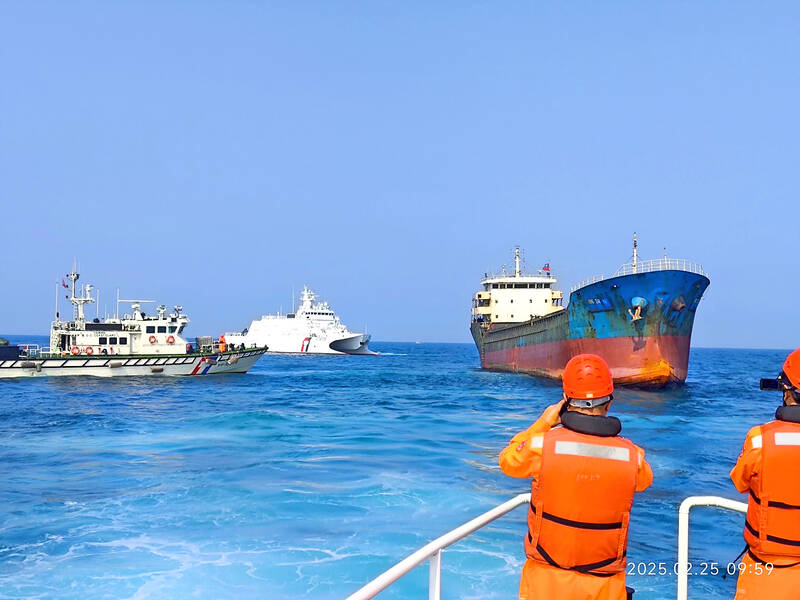The Executive Yuan yesterday advanced amendments to seven laws to protect critical underwater infrastructure, applying the same penalties for damaging water and natural gas pipelines to damaging submarine cables.
The amendments also include provisions for confiscating vessels used in such crimes, while requiring all ships to keep their automatic identification systems on or face penalties.
Taiwan relies heavily on infrastructure such as undersea cables, and power and energy pipelines, which support the nation’s digital economy and people’s livelihoods, the Cabinet said.

Photo courtesy of the Coast Guard Administration
However, illegal intrusions and sabotaging of undersea cables over the past few years have affected external and internal communications, as well as potentially jeopardizing energy transmission and national security, it said.
Minister Without Portfolio Lin Ming-hsin (林明昕) said that of the seven proposed amendments, five address penalties and complementary measures concerning undersea cable sabotage in the Telecommunications Management Act (電信管理法), the Electricity Act (電業法), the Natural Gas Enterprise Act (天然氣事業法), the Tap Water Act (自來水法) and the Meteorological Act (氣象法).
The other two are in the Commercial Port Act (商港法) and the Shipping Act (船舶法), which cover vessel control, he said.
While critical infrastructure is already protected by law, the amendments extend that protection to water and natural gas pipelines, with penalties to be applied in accordance with the Telecommunications Management Act, Lin said.
Those who endanger the normal functioning of submarine cables through theft or destruction face a prison term of one to seven years and a maximum fine of NT$10 million (US$332,149).
Those found guilty of intentionally endangering national security or social stability would face a sentence of three to 10 years in jail and a fine of up to NT$50 million, the proposed amendments say.
If a person’s actions result in disaster, death or serious injury, the maximum penalty is life in prison and a NT$100 million fine, while negligence is punishable by up to six months in prison, detention or a fine of up to NT$2 million.

Right-wing political scientist Laura Fernandez on Sunday won Costa Rica’s presidential election by a landslide, after promising to crack down on rising violence linked to the cocaine trade. Fernandez’s nearest rival, economist Alvaro Ramos, conceded defeat as results showed the ruling party far exceeding the threshold of 40 percent needed to avoid a runoff. With 94 percent of polling stations counted, the political heir of outgoing Costa Rican President Rodrigo Chaves had captured 48.3 percent of the vote compared with Ramos’ 33.4 percent, the Supreme Electoral Tribunal said. As soon as the first results were announced, members of Fernandez’s Sovereign People’s Party

MORE RESPONSIBILITY: Draftees would be expected to fight alongside professional soldiers, likely requiring the transformation of some training brigades into combat units The armed forces are to start incorporating new conscripts into combined arms brigades this year to enhance combat readiness, the Executive Yuan’s latest policy report said. The new policy would affect Taiwanese men entering the military for their compulsory service, which was extended to one year under reforms by then-president Tsai Ing-wen (蔡英文) in 2022. The conscripts would be trained to operate machine guns, uncrewed aerial vehicles, anti-tank guided missile launchers and Stinger air defense systems, the report said, adding that the basic training would be lengthened to eight weeks. After basic training, conscripts would be sorted into infantry battalions that would take

GROWING AMBITIONS: The scale and tempo of the operations show that the Strait has become the core theater for China to expand its security interests, the report said Chinese military aircraft incursions around Taiwan have surged nearly 15-fold over the past five years, according to a report released yesterday by the Democratic Progressive Party’s (DPP) Department of China Affairs. Sorties in the Taiwan Strait were previously irregular, totaling 380 in 2020, but have since evolved into routine operations, the report showed. “This demonstrates that the Taiwan Strait has become both the starting point and testing ground for Beijing’s expansionist ambitions,” it said. Driven by military expansionism, China is systematically pursuing actions aimed at altering the regional “status quo,” the department said, adding that Taiwan represents the most critical link in China’s

‘REALLY PROUD’: Nvidia would not be possible without Taiwan, Huang said, adding that TSMC would be increasing its capacity by 100 percent Nvidia Corp CEO Jensen Huang (黃仁勳) on Saturday praised and lightly cajoled his major Taiwanese suppliers to produce more to help power strong demand for artificial intelligence (AI), capping a visit to the country of his birth, where he has been mobbed by adoring fans at every step. Speaking at an impromptu press conference in the rain outside a Taipei restaurant, where he had hosted suppliers for a “trillion-dollar dinner,” named after the market capitalization of those firms attending, Huang said this would be another good year for business. “TSMC needs to work very hard this year because I need a lot